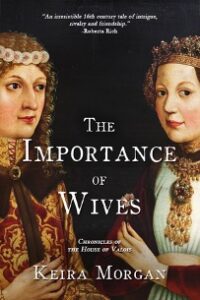Launch: Keira Morgan’s The Importance of Wives: Chronicles of the House of Valois
INTERVIEW BY LESLIE S. LOWE
As a child, Keira Morgan was a bookworm. She discovered the Renaissance as a wonderful place of queens, princesses, and castles. She studied the period at university and realized that life for those same queens and princesses in their castles wasn’t nearly as romantic as she had dreamed, but was much more fascinating. The clothing, the food, the way people travelled, how they lived, how they brought up their children, what they thought about, and why—all these things intrigued her.
After a career in the Canadian public service, during which she wrote fiction about the period, she moved to Mexico where she pursues her writing full time. She has just completed The Importance of Wives, her third published novel about Anne of Brittany in The Chronicles of the House of Valois series. The Importance of Sons and The Importance of Pawns continue the story of this determined woman who was twice queen of France.
She is part of the France’s Splendid Centuries author collaboration, who are presenting at the HNS UK 2024 conference.
How would you describe this book and its themes in a couple of sentences?
It is 1488. Duchess Anne of Brittany is not quite twelve, yet her situation could not be more perilous. She is a girl, who has just inherited one of the richest duchies in Europe. Enemies surround her—and men do not believe that women can rule.
 What inspired you to start writing historical fiction and what has been most rewarding about it?
What inspired you to start writing historical fiction and what has been most rewarding about it?
I cannot remember a time when I didn’t love reading historical fiction. The first historical novels I remember were Nora Loft’s The Concubine and Anya Seton’s Katherine and I became an addict of the genre. So, it felt natural to move from reading it to trying to write it myself.
I studied history at university, so the most rewarding part of writing fiction has been turning my knowledge about the period into people and a world that feel real to me. I know them, the problems they faced, what was going on around them and I have strong feelings for and about them. Learning to write stories people actually want to read has also been rewarding.
How is this latest novel different from your other Chronicles of the House of Valois novels, The Importance of Pawns and The Importance of Sons?
The Importance of Wives is the first novel in this series, though I wrote it after the other two. It begins when Anne becomes duchess, the moment when her protected childhood ends. She is plunged into adult responsibilities when she is not yet twelve; a daunting challenge even if everyone around her supported her, which they did not. In contrast, when the Dauphin Charles became king of France at the age of eleven in 1483, his guardians supported him and his rights against all his opponents.
This novel starts with the beginning of Anne’s lifelong challenge. It explores the opposition girls faced as heiresses. During this period, many male lines failed, and girls inherited large and rich territories. Few managed to retain control of them, even fewer tried. Anne had no intention of giving up her duchy without a fight. This novel tells that story.
Why the focus on this topic now? Is there a key historical event you found in researching that inspired you to write this story to portray a key message for now?
When I first discovered Anne in university, separatism had become a key issue in Canada. Anne’s struggle to maintain her duchy’s independence in the face of the strong centralizing forces in France caught my attention.
As I learned more about her, I became intrigued by her personal struggle to assert her right to rule her duchy and to oppose her advisors’ conviction that females were incapable of reigning but must have a man to govern for them. This ties in with current women’s struggles. Although the concept of women’s rights did not exist at the time, many women were insulted by the negative beliefs about their innate capacities. Anne insisted that women were as intelligent and capable as men. In her opinion, her rights stemmed from the concept of justice and the manifest will of God. She believed that since God had chosen her as the legitimate duchess, she would not permit anyone to usurp her rights.
How do the characters transform within the story over the series? What did that journey mean to you as you wrote it?
As the book opens, Anne is arrogant and defiant. She makes no effort to see anyone else’s point of view. Naturally, this does not make her likeable to her advisors. As she experiences the defeats that life deals her, she swallows many bitter pills and learns enough life lessons that she matures. She discovers she must adapt to others and to the circumstances in which she finds herself.
In the first two books in the series, the events that occur illustrate this concretely: the death of her father, the rebellion of her guardians, her allies abandoning her to side with the rebel forces, to mention only a few. The last book, The Importance of Pawns, moves on from Anne to her daughters and the challenges they face after their parents die.
One of the things I appreciate about writing is the opportunity to explore your own emotions. Even though my characters may be different from me, when they face tragedies, triumphs, or obstacles, I focus on their humanity. Responses to grief, joy, fear, anger, and other feelings are universal although the stimuli are not.
How do you think the reader will connect with Duchess Anne of Brittany in this book?
According to early reviews, readers empathize with Anne. She is young and she makes mistakes, but she learns from them. She also shows that she is kind, courageous and cares deeply for the people of Brittany. We have all been young and idealistic and have had to face hard choices. Anne’s setting may be historical, but her struggles and feelings are universal.
How did you balance the research with writing the story? Did you get to do any interesting interviews for your research about Duchess Anne?
I have been learning about Anne and the period for decades, so now my research is specific to a particular place or incident. I keep up with whatever new I can find about my period but all of it must be available via the internet because I live in Mexico. However, that is not a big limitation nowadays.
You have written three books in this series. What are you working on now? Is it connected to this one or your other work in any way?
I have begun the fourth and final book in this series. It is third in chronological order and follows The Importance of Sons. Its title is The Importance of Heirs, and it covers Anne’s life with her husband Louis and her second time as Queen of France.
How have your life and work experiences been incorporated with or assisted you in your writing?
I studied Renaissance and Reformation history to doctoral level at university. I am fluent in English and French as a Quebecois Canadian who worked for the Federal Government for thirty years. I grew up with a passion for reading and history. My mother was a history teacher and an avid reader. Writing and editing were also important parts of my working life.
Every author has their own publishing journey. Tell me about yours.
For years, I kept my writing as my secret vice and didn’t share anything I wrote. When I started moving for my job, I began to take writing courses and to join local writers’ associations where I was living and drafted short stories while I was still working. I did not try to publish anything until I moved to Mexico. At that point. I wrote non-fiction articles that were published in local English language magazines and sent out some short stories while I wrote my first novel. Then I searched for an agent or publisher for a year while I worked on my second novel. Eventually I concluded that I was not going to achieve success via traditional publishing without investing a lot more time and effort. I decided to try self-publishing, found an editor to revise my manuscript, took a course on self-publishing, got myself a book formatting program and finished my book. Then I put it up on Amazon and took another course on marketing. It worked out well enough that I decided to stick with self-publishing.
 What advice would you give to other aspiring historical writers?
What advice would you give to other aspiring historical writers?
First, decide on your goals when choosing what to write. Do you want a wide audience and financial success as a writer? Then write historical fiction in genres people want to read and traditional publishers will choose. Only if those are not your primary goals, can you write what you love.
Second, find a supportive writing group. Writing is lonely, and improving your craft is almost impossible without critiques from people you can trust to give you honest yet kind feedback.
What is the last great book you read? Why?
The Weight of Ink by Rachel Kadish. Its rendering of 17th century life resonates with authenticity, and it probes deep beneath the surface of the lives of its characters. It is filled with memorable characters struggling with loneliness in difficult circumstances who question love, honesty, truth, God, and belief.






